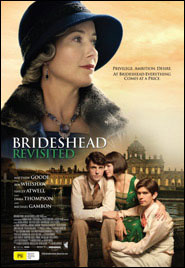Matthew Goode, Brideshead Revisited, The Watchmen Interview

Matthew Goode, Brideshead Revisited, The Watchmen Interview
MORE THAN GOODE ROLES FOR RISING STAREXCLUSIVE Matthew Goode, Brideshead Revisited, The Watchmen Interview by Paul Fischer
British actor Matthew Goode is on a roll. The young up-and-coming actor, who rose to prominence in Woody Allen's Match Point, is starring in two very distinctive and eagerly waited films. First off, he stars as the social-climbing Charles Ryder in the big screen adaptation of the classic novel Brideshead Revisited, to be succeeded by the lead dual roles of Adrian Veidt and Ozymandias in the adaptation of the graphic novel.
In this exclusive interview, Goode talks acting, Hollywood and these latest movies.
Paul Fisher Do you feel at all at any time making Brideshead, that you were either consciously or not consciously channeling Jeremy Irons at any time?
Matthew Goode: Well, I think if there's any similarities between our performances it's not because I watched it again. I saw it five years previous to I was actually doing it, and I think, you know, obviously we're playing the same part and we're both sort of six foot tall, thin appearance with baritone voices. So, but I mean, and also, I suppose, you know, it's a really tricky one to say, but you can't really channel somebody else when you're working with completely different actors in different scenarios. Well, not different scenarios, but it's a different adaptation, you know?
Paul Fisher How difficult was it for you to get this role, of Charles Ryder?
Matthew Goode: Very difficult. I mean, I don't know all the other actors that were brought in, but it certainly wasn't offered to me on a plate by any stretch of the imagination. I think it's always difficult, in comparison to Watchmen, which I was just so lucky to have not known about or to have read it before I auditioned for it, because it was such a weird quick process, suddenly I had these two scenes thrown at me, and I had to cobble together an audition and send it on tape and never expected anything back from it. With this, I knew of, you know, it's such an amazing novel and I'd read it and it's so beloved. Actually, it was difficult for me, I didn't necessarily "get" Charles, it took me a long time to sort of get back the layers of him.
Paul Fisher What are they?
Matthew Goode: I don't know why it was, really, he's just one of those people that because he's so, you just have to, his psychology, he's just such a lonely individual, and I think because in the book he doesn't really, although he's talking about it the whole time, he is the narrator of the story, we see everything through his eyes but he doesn't necessarily tell you so much about what he's feeling all the time or what his genetic makeup is. So.
Paul Fisher What are the challenges of playing a character who seems so emotionally isolated?
Matthew Goode: Exactly. Those are the problems, it's the ambiguities, really, because you have to make certain decisions on things, but I also don't like making concrete black and white decisions in areas that are quite gray, such as is sexuality. What were the things that he was thinking, you know, what are his views upon social climbers, you know, particularly with the autobiographical stuff, how much of Evelyn Waugh is in there? You know? Which is probably why, the reason why he said, "I don't write psychology, I write because of the beauty of the words." Sort of that's a good get-out clause.
Paul Fisher Do you think Charles Ryder is being a social climber, or is he much more complicated than that?
Matthew Goode: I think he's as much a social climber as we all are. I think if we were an all-out social climber, someone a bit like Mr. Samgrass, then Sebastian wouldn't have gone anywhere near him. So I think you get shown this world, and why wouldn't any of us, if we were dropped into it, want to remain part of it? He's in Easties, and suddenly he's surrounded by beauty. If you take him as someone who's just had an incredibly lonely childhood, and a loveless childhood at that, his, you know, his love affair is as much with Brideshead as it is with Sebastian and Julia, so.
Paul Fisher How empathetic do you think he is? Do you have empathy for him?
Matthew Goode: I think we do. That's one of the he's so cold, there's this sort of future voice that describes the story and takes us back into the past. That's one of the reasons I find him tough at the beginning, it's like when he describes when he first slept with Julia, it was like taking the keys to the freehold-it's a very cold comment and a statement. So you have to find something, and I say that knowing that he's had this sort of horrid childhood. That immediately makes him empathetic to me, and I think everyone can understand that, you know, because we can only compare it to our own. You can only think, well thank God I didn't have that. But I think there was an area of his life where he did get ambitious. He did all the right things, you know, everyone forgets, everyone is sympathetic more with Sebastian, but Sebastian is quite a petulant drunk in many ways, and isn't there for his friend. So yes, he didn't bring him back from Morocco, but he still went and he still tried.
Paul Fisher How intimidating was it for you to work with people like Emma Thompson?
Matthew Goode: You know what? She brings baggage into the room, because I've never met someone who's so universally beloved. And you want, you watch someone's performance, like Remains of the Day, and Howard's End, and you're like, "God, she's so good." And she immediately dispels all those sort of, all of your worries about working with someone who's so great. By being, she's the most open-hearted and honest, she's just a beautiful person to have, and she's become a really good friend. So, and, you know, it's the same with [Michael] Gambon. He's the reason I started acting, pretty much, was when I saw him do Volpone on the stage when I was 17, I was like, Wow, that must be amazing to feel that, and to work towards being that good. So, and he's the same, you know, he is one of the funniest, you know, he's just a rogue and a gentleman. That's the best part about the job, really, is meeting characters like that.
Paul Fisher Talk about one of the themes, of the film, and the book of course, is that of the British class system of the twenties and thirties. How contemporary do you think those themes are, especially to American audiences?
Matthew Goode: In what sense?
Paul Fisher Do you think American audiences can identify with that facet of the story?
Matthew Goode: Well, I mean, I think so. Obviously it's a period piece, things aren't like that in my own country now. But the class something is something that, as well know from having watched Match Point, that really gets the British press's back up when it's not portrayed in the right way. So that's a worry. But I think, you know, the Americans have their own kind of aristocracy, and in a credit crunch maybe they'll be able to understand it even more. I don't know.
Paul Fisher When you first trained as an actor, or at drama school, did you expect to be doing the kind of work you'd be doing now? Is this where you expected to be?
Matthew Goode:I don't really know what I was thinking at that point. There were definitely a point where I took some convincing to go to drama school. It was like, "I don't know what I want to do," and it was friends saying, "Give it a try, because you'll always look back on it." And I was like, "Well, it's expensive," so I had to get a loan from the bank and then went. I think, I feel like I'm still training, I don't think you ever stop. So but I never, I never imagined that I'd be at this level. I didn't have any friends who were actors, and my family had nothing to do with it at all, really. So, you know, on a professional level engagement. So.
Paul Fisher What drew you to it in the first place?
Matthew Goode: I don't really know, it was just something I could never stop really doing. I suppose there's some sort of subconscious or, you know, some sort of exorcism that's needed. But I can't really put my finger on it, all I know is that I enjoy it.
Paul Fisher What was the process like getting The Watchmen? It's such a different piece, obviously than anything you'd done previously?
Matthew Goode: It was very bizarre. I didn't know the book, or the graphic novel. There was no time. It was halfway through Brideshead when somebody said, "we'd like you to audition for this," and I was like, I don't have the time. And they sent these scenes. It was very, very quick. They sent these two scenes up, and my American agents were like, "You've got to get it done this Sunday or you can lose out on the project, and it's something you should really consider doing." So I was like, OK, they sent them up, it was a Sunday morning. There was nowhere to do it in the hotel so we did it in my bathroom with me sitting on the loo with like a white sheet behind me. I'm immediately thinking, I haven't even had the lines, this is never going to go to me. I think it's a credit to Scott Vann really. If I didn't have the lookout behind me, I'd never have even been considered, I don't think.
Paul Fisher What was the experience like of making the film? How difficult was it to work with all the visual effects and all that kind of stuff?
Matthew Goode: Actually, most of the stuff I did didn't involve any green screen at all. It's actually not that much green screen considering the type of film it is, involved in it, which is a testament to Zack [Snyder, director] and Zack wanting to, being a fan himself, wanting to get every nuance and every detail built. The thing that I found difficult was being exhausted coming of Brideshead and two days later I'm starting a film of a totally different kind of genre with a totally different kind of character. And felt like I hadn't quite enough time to sort of research it. But luckily I had a couple of weeks. A couple of weeks off here and there.
Paul Fisher How would you describe Adrian Veidt?
Matthew Goode: Adrian is obviously quite morally ambiguously. The way the story starts, he looks like he's a bit of a sellout because after the Keane Acts, he sort of got out of being a superhero two years previously to the Keane Act coming into being. So he seems to be disliked, mainly by Rorschach, who when he enters the fray he seems like one of the main heroes of the piece. It's kind of like, "Oh, OK." I always want to like my character. But he obviously has this master plan. I don't know, I really like his moral ambiguity, and the fact that he's not seeking fame for what he's doing. He is just genuinely trying to solve world peace. So, yeah.
Paul Fisher Is there a transformation to Ozymandias?
Matthew Goode: Well, Ozymandias is obviously his alter ego, right? There's no sort of great transformation. That's for a good thing, because I could never put that suit on particularly quickly. It requires a lot of talcum powder. But yeah, but I mean, there's a sort of physical empowerment once you do put one of those things on. It's kind of good, you got what's interesting about the character is that we developed a very interesting difference between the public and the private personas. That's just him and him, and also with his alter ego as well. So he's complicated, and multi-layered.
Paul Fisher How do you feel about doing a film where there is added pressure on you from fans of this kind of genre?
Matthew Goode:I think it's the same with Brideshead, I could understand it a bit more. Once you do something which is so revered, which is also, you know, both of those are in the top 100 novels lists, so. I got it and you really need to trust your director at that point. I think Watchmen got the best director it could have gotten.
Paul Fisher You're going to Comic Con aren't you?
Matthew Goode: Yup, I'll be there. The entire cast is going to be there.
Paul Fisher Are you looking forward?
Matthew Goode:I'm slightly scared, actually, because they, you know, this is one of the most intelligent audiences I think you can probably come across. Every little-it's a bit scary. I don't want to give them anymore license than they already have just to look at my physical being, and say, he shouldn't have got the role. So, I don't want to say the wrong things in front of this seven thousand crowd. Otherwise they'll be after my blood.
Paul Fisher What are your plans next? Do you have any idea?
Matthew Goode: Yeah, no plans really. It's going to be doing stuff for Watchmen and just reading scripts and trying to find the right thing. This strike might occur and stuff, so.
Paul Fisher Have you heard anything?
Matthew Goode: I haven't heard a thing, no . I'm not actually a member of SAG, but it still affects me because you don't want to cross picket lines, so.
Paul Fisher?
Matthew Goode:?
Paul Fisher Hayley [Atwell] was telling me earlier that she finds it important to return to the theater. Have you thought of that?
Matthew Goode: It's something I'm looking into, because I haven't done it for four or five years, so I'm just trying to find the right play.
Paul Fisher Is there a part that you have a burning desire to play?
Matthew Goode: I'm probably starting to get a little too old, I did really used to want to play, I think it's Tom in Glass Menagerie. I always loved that play.
MORE
- Viggo Mortensen The Road
- 24 Cast Reunion
- Aaron Eckhardt No Reservations
- Aaron Eckhart The Dark Knight
- Adam McKay Step Brothers Interview
- Alan Alda Diminished Capacity Interview
- Alan Alda Diminished Capacity Interview
- Alex Dimitriades
- Al Pacino Oceans 13
- Alan Rickman Snow Cake
- Alan Rickman Sweeney Todd



